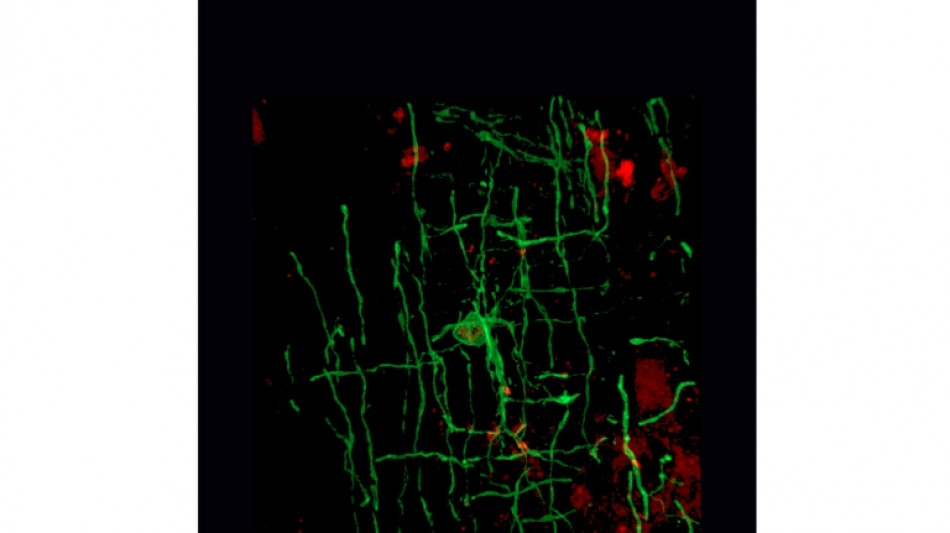
-
 Asia stocks make bright start to 2026
Asia stocks make bright start to 2026
-
Miami and Houston stretch NBA win streaks to four games

-
 Swiss investigators rush to identify victims of New Year's fire
Swiss investigators rush to identify victims of New Year's fire
-
Bicycle kick king El Kaabi is new AFCON hero for hosts Morocco

-
 What to look out for in the Premier League transfer window
What to look out for in the Premier League transfer window
-
Maduro elusive on US attack, open to dialogue

-
 Venus Williams gets Australian Open wildcard aged 45
Venus Williams gets Australian Open wildcard aged 45
-
Trump blames bruised hand on aspirin, denies falling asleep

-
 Dress for success: Mexican president's ideological attire
Dress for success: Mexican president's ideological attire
-
Best of frenemies: Saudi, UAE rivalry bursts into view

-
 'Positive signs' on hospitalised Australian cricket great Martyn
'Positive signs' on hospitalised Australian cricket great Martyn
-
North Korean leader's daughter in first visit to symbolic mausoleum

-
 The Crans-Montana fire: a Swiss tragedy that raises questions
The Crans-Montana fire: a Swiss tragedy that raises questions
-
Around 40 killed as fire ravages Swiss ski resort New Year party

-
 Australia's Khawaja to retire after Ashes finale, slams 'racial stereotyping'
Australia's Khawaja to retire after Ashes finale, slams 'racial stereotyping'
-
Evotec Appoints Dr. Sarah Fakih as EVP, Head of Global Communications and Investor Relations

-
 Frank accepts 'boring' jibes from Spurs fans after Brentford stalemate
Frank accepts 'boring' jibes from Spurs fans after Brentford stalemate
-
Guardiola vexed by Man City's sloppy finishing in Sunderland draw

-
 Tears and stunned silence at vigil for Swiss fire victims
Tears and stunned silence at vigil for Swiss fire victims
-
Wembanyama to miss Spurs' NBA game Friday at Indiana: reports

-
 Man City charge stalls at Sunderland, Liverpool held by Leeds
Man City charge stalls at Sunderland, Liverpool held by Leeds
-
Man City's title bid dented by Sunderland stalemate

-
 Australia's Khawaja announces retirement from international cricket
Australia's Khawaja announces retirement from international cricket
-
Niners seek win for home-field playoff edge into Super Bowl

-
 New York mayor Mamdani pledges left-wing success after taking office
New York mayor Mamdani pledges left-wing success after taking office
-
Slot frustrated by blunt Liverpool in Leeds stalemate

-
 Toothless Liverpool held by Leeds
Toothless Liverpool held by Leeds
-
Dozens killed as fire ravages Swiss ski resort New Year party

-
 K-pop stars BTS to release album in March ahead of world tour
K-pop stars BTS to release album in March ahead of world tour
-
Fresh clashes kill six in Iran cost-of-living protests

-
 Nigeria kicks off new tax regime vowing relief for low earners
Nigeria kicks off new tax regime vowing relief for low earners
-
Dozens killed in fire at Swiss ski resort New Year party

-
 Leftist Mamdani begins first day as New York mayor
Leftist Mamdani begins first day as New York mayor
-
Dozens believed killed in fire at Swiss ski resort New Year party

-
 Brazil Supreme Court rejects Bolsonaro request for house arrest on health concerns
Brazil Supreme Court rejects Bolsonaro request for house arrest on health concerns
-
Israel confirms ban on 37 NGOs in Gaza

-
 Russia blames Ukraine for deadly New Year drone strike
Russia blames Ukraine for deadly New Year drone strike
-
Coach Maresca leaves Chelsea - club

-
 'Several dozen' believed killed in fire at Swiss ski resort New Year party
'Several dozen' believed killed in fire at Swiss ski resort New Year party
-
China's BYD logs record EV sales in 2025

-
 Yemen separatists say Saudi-backed forces to deploy in seized territories
Yemen separatists say Saudi-backed forces to deploy in seized territories
-
Wales rugby star Rees-Zammit signs long-term deal to stay at Bristol

-
 'Several dozen' believed killed in fire at Swiss ski resort New Year bash
'Several dozen' believed killed in fire at Swiss ski resort New Year bash
-
Hakimi, Salah and Osimhen head star-packed AFCON last-16 cast

-
 Israel says it 'will enforce' ban on 37 NGOs in Gaza
Israel says it 'will enforce' ban on 37 NGOs in Gaza
-
Near record number of small boat migrants reach UK in 2025

-
 Several dead as fire ravages bar in Swiss ski resort town Crans Montana: police
Several dead as fire ravages bar in Swiss ski resort town Crans Montana: police
-
Tsitsipas considered quitting tennis during injury-hit 2025

-
 Sabalenka wants 'Battle of the Sexes' rematch and revenge
Sabalenka wants 'Battle of the Sexes' rematch and revenge
-
Osaka drawing inspiration from family at United Cup

| SCS | 0.12% | 16.14 | $ | |
| RBGPF | -0.37% | 80.75 | $ | |
| RELX | -1.71% | 40.42 | $ | |
| RYCEF | 0.13% | 15.51 | $ | |
| AZN | -0.63% | 91.93 | $ | |
| BTI | 0.12% | 56.62 | $ | |
| RIO | -0.61% | 80.03 | $ | |
| CMSC | -0.15% | 22.65 | $ | |
| NGG | -0.54% | 77.35 | $ | |
| GSK | -0.53% | 49.04 | $ | |
| BCE | 1.05% | 23.82 | $ | |
| CMSD | 0.09% | 23.15 | $ | |
| VOD | -0.15% | 13.21 | $ | |
| BCC | -0.26% | 73.6 | $ | |
| BP | -0.06% | 34.73 | $ | |
| JRI | 0.22% | 13.61 | $ |

Ancient viruses responsible for our big brains and bodies: study
Ancient viruses that infected vertebrates hundreds of millions of years ago played a pivotal role in the evolution of our advanced brains and large bodies, a study said Thursday.
The research, published in the journal Cell, examined the origins of myelin, an insulating layer of fatty tissue that forms around nerves and allows electrical impulses to travel faster.
According to the authors, a gene sequence acquired from retroviruses -- viruses that invade their host's DNA -- is crucial for myelin production, and that code is now found in modern mammals, amphibians and fish.
"The thing I find the most remarkable is that all of the diversity of modern vertebrates that we know of, and the size they've achieved: elephants, giraffes, anacondas, bullfrogs, condors wouldn't have happened," senior author and neuroscientist Robin Franklin of Altos Labs-Cambridge Institute of Science told AFP.
In new research led by Tanay Ghosh, a computational biologist and geneticist in Franklin's lab, analysts trawled through genome databases to try to discover the genetics that were likely associated with the cells that produce myelin.
Specifically, he was interested in exploring mysterious "noncoding regions" of the genome that have no obvious function and were once dismissed as junk, but are now recognized as having evolutionary importance.
Ghosh's search landed upon a particular sequence derived from an endogenous retrovirus, long lurking in our genes, which the team dubbed "RetroMyelin."
To test their finding, researchers carried out experiments in which they knocked down the RetroMyelin sequence in rat cells, and found they no longer produced a basic protein required for myelin formation.
- Faster reactions, bigger bodies -
Next, they searched for RetroMyelin-like sequences in the genomes of other species, finding similar code in jawed vertebrates -- fellow mammals, birds, fish, reptiles and amphibians -- but not in jawless vertebrates or invertebrates.
This led them to believe the sequence appeared in the tree of life around the same time as jaws, which first evolved around 360 million years ago in the Devonian period, called the Age of Fishes.
"There's always been an evolutionary pressure to make nerve fibers conduct electrical impulses quicker," said Franklin. "If they do that quicker, then you can act quicker," he added, which is useful for both predators trying to catch things, and prey trying to flee.
Myelin enables rapid impulse conduction without widening the diameter of nerve cells, allowing them to be packed closer together.
It also provides structural support, meaning nerves can grow longer, allowing for longer limbs.
In myelin's absence, invertebrates have found other ways to transmit signals faster -- giant squids for example have evolved wider nerve cells.
Finally, the team wanted to learn whether the retroviral infection happened once, to a single ancestor species, or whether it happened more than once.
- More discoveries await? -
To answer this, they used computational methods to analyze the RetroMyelin sequences of 22 jawed vertebrate species, finding the sequences were more similar within than between species.
The finding suggested multiple waves of infection led to the diversity of vertebrate species we see today, the team said.
"One tends to think of viruses as pathogens, or disease causing agents," said Franklin.
But the reality is more complicated, he said: at various points in history retroviruses have entered the genome and integrated themselves into a species' reproductive cells, allowing them to be passed down to future generations.
One of the most well known examples is the placenta -- one of the defining characteristics of most mammals -- which we acquired from a pathogen embedded in our genome in the deep past.
Ghosh said the myelin finding could be just another step in an emerging field. "There are still a lot of things to understand still in terms of biology about how these sequences are driving different processes of evolution," he said.
D.Sawyer--AMWN



